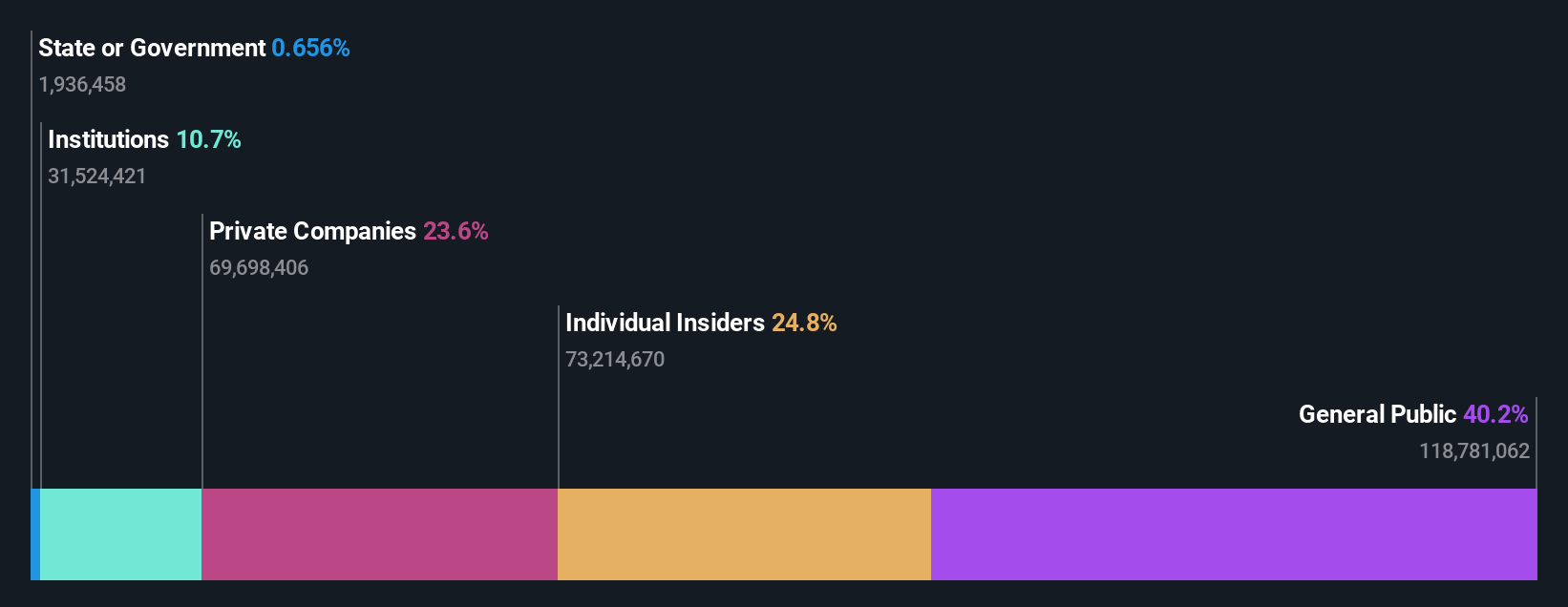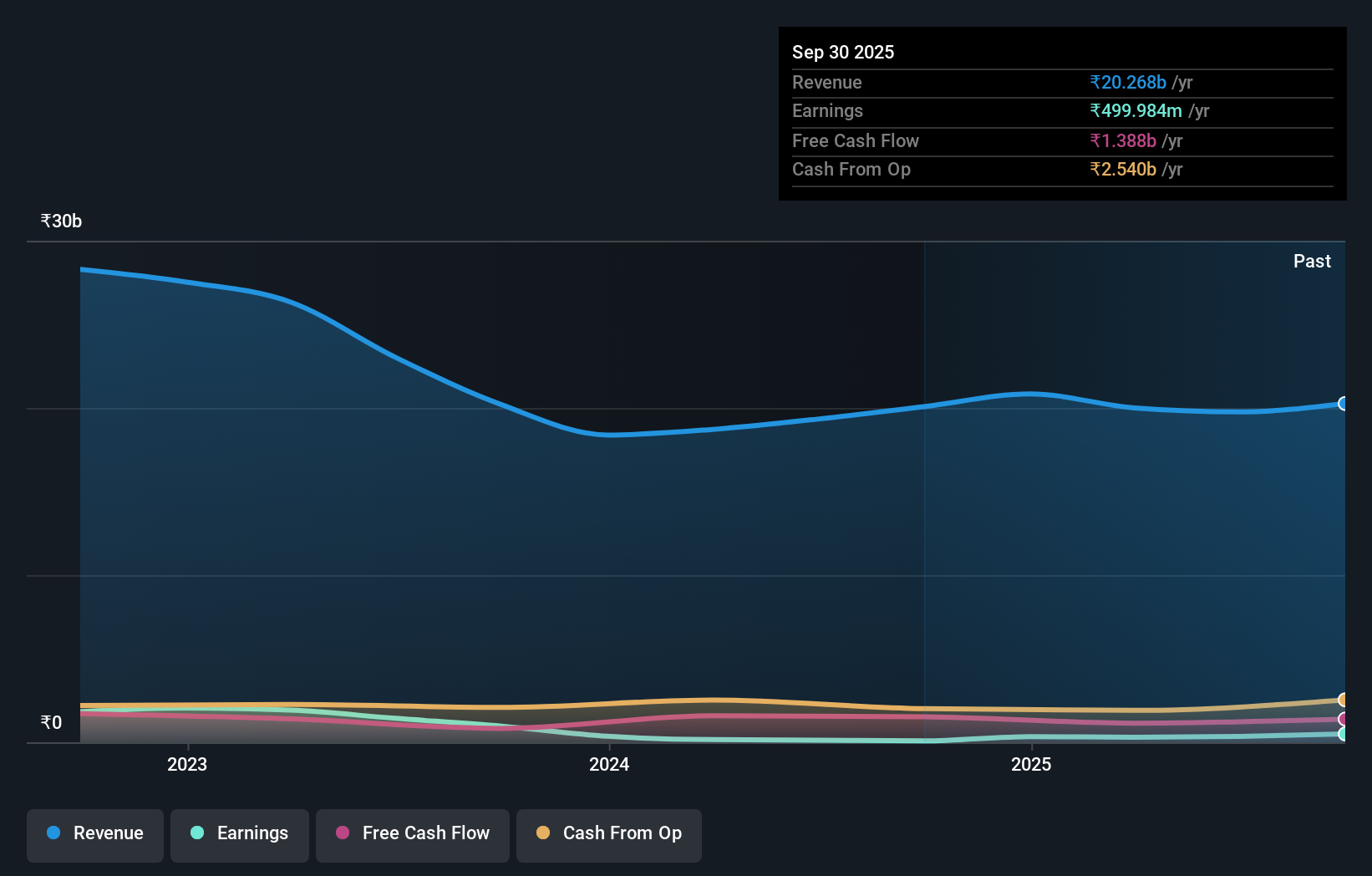DCW Limited (NSE:DCW) surges 11%; individual investors who own 40% shares profited along with insiders
Key Insights
- The considerable ownership by individual investors in DCW indicates that they collectively have a greater say in management and business strategy
- 51% of the business is held by the top 14 shareholders
- Insider ownership in DCW is 25%
If you want to know who really controls DCW Limited (NSE:DCW), then you'll have to look at the makeup of its share registry. And the group that holds the biggest piece of the pie are individual investors with 40% ownership. That is, the group stands to benefit the most if the stock rises (or lose the most if there is a downturn).
While individual investors were the group that benefitted the most from last week’s ₹2.1b market cap gain, insiders too had a 25% share in those profits.
Let's take a closer look to see what the different types of shareholders can tell us about DCW.
See our latest analysis for DCW

What Does The Institutional Ownership Tell Us About DCW?
Institutions typically measure themselves against a benchmark when reporting to their own investors, so they often become more enthusiastic about a stock once it's included in a major index. We would expect most companies to have some institutions on the register, especially if they are growing.
We can see that DCW does have institutional investors; and they hold a good portion of the company's stock. This can indicate that the company has a certain degree of credibility in the investment community. However, it is best to be wary of relying on the supposed validation that comes with institutional investors. They too, get it wrong sometimes. If multiple institutions change their view on a stock at the same time, you could see the share price drop fast. It's therefore worth looking at DCW's earnings history below. Of course, the future is what really matters.

Hedge funds don't have many shares in DCW. Our data shows that Sahu Brothers Pvt Ltd is the largest shareholder with 18% of shares outstanding. With 5.2% and 4.5% of the shares outstanding respectively, Ashish Jain and Vivek Jain are the second and third largest shareholders. Note that the second and third-largest shareholders are also Senior Key Executive and Member of the Board of Directors, respectively, meaning that the company's top shareholders are insiders.
Looking at the shareholder registry, we can see that 51% of the ownership is controlled by the top 14 shareholders, meaning that no single shareholder has a majority interest in the ownership.
While it makes sense to study institutional ownership data for a company, it also makes sense to study analyst sentiments to know which way the wind is blowing. We're not picking up on any analyst coverage of the stock at the moment, so the company is unlikely to be widely held.
Insider Ownership Of DCW
The definition of company insiders can be subjective and does vary between jurisdictions. Our data reflects individual insiders, capturing board members at the very least. Management ultimately answers to the board. However, it is not uncommon for managers to be executive board members, especially if they are a founder or the CEO.
I generally consider insider ownership to be a good thing. However, on some occasions it makes it more difficult for other shareholders to hold the board accountable for decisions.
Our most recent data indicates that insiders own a reasonable proportion of DCW Limited. Insiders have a ₹5.2b stake in this ₹21b business. This may suggest that the founders still own a lot of shares. You can click here to see if they have been buying or selling.
General Public Ownership
The general public, who are usually individual investors, hold a 40% stake in DCW. While this size of ownership may not be enough to sway a policy decision in their favour, they can still make a collective impact on company policies.
Private Company Ownership
It seems that Private Companies own 24%, of the DCW stock. It might be worth looking deeper into this. If related parties, such as insiders, have an interest in one of these private companies, that should be disclosed in the annual report. Private companies may also have a strategic interest in the company.
Next Steps:
While it is well worth considering the different groups that own a company, there are other factors that are even more important.
I always like to check for a history of revenue growth. You can too, by accessing this free chart of historic revenue and earnings in this detailed graph.
Of course this may not be the best stock to buy. So take a peek at this free free list of interesting companies.
NB: Figures in this article are calculated using data from the last twelve months, which refer to the 12-month period ending on the last date of the month the financial statement is dated. This may not be consistent with full year annual report figures.
New: Manage All Your Stock Portfolios in One Place
We've created the ultimate portfolio companion for stock investors, and it's free.
• Connect an unlimited number of Portfolios and see your total in one currency
• Be alerted to new Warning Signs or Risks via email or mobile
• Track the Fair Value of your stocks
Have feedback on this article? Concerned about the content? Get in touch with us directly. Alternatively, email editorial-team (at) simplywallst.com.
This article by Simply Wall St is general in nature. We provide commentary based on historical data and analyst forecasts only using an unbiased methodology and our articles are not intended to be financial advice. It does not constitute a recommendation to buy or sell any stock, and does not take account of your objectives, or your financial situation. We aim to bring you long-term focused analysis driven by fundamental data. Note that our analysis may not factor in the latest price-sensitive company announcements or qualitative material. Simply Wall St has no position in any stocks mentioned.
About NSEI:DCW
DCW
Engages in the manufacture and sale of heavy chemical products in India.
Flawless balance sheet with solid track record.
Similar Companies
Market Insights
Community Narratives




